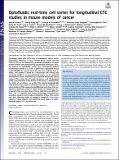Optofluidic real-time cell sorter for longitudinal CTC studies in mouse models of cancer
Author(s)
Hamza, Bashar M.; Ng, Sheng Rong; Prakadan, Sanjay; Delgado, Francisco Feijo; Chin, Christopher R.; King, Emily M.; Yang, Lucy F.; Davidson, Shawn Michael; DeGouveia, Kelsey L.; Cermak, Nathan; Warren Navia, Andrew; Winter, Peter S.; Drake, Riley; Tammela, Tuomas; Li, Carman Man-Chung; Papagiannakopoulos, Thales; Gupta, Alejandro J.; Shaw Bagnall, Josephine; Knudsen, Scott; Vander Heiden, Matthew G.; Wasserman, Steven; Jacks, Tyler E; Shalek, Alexander K; Manalis, Scott R; ... Show more Show less
DownloadPublished version (1.051Mb)
Terms of use
Metadata
Show full item recordAbstract
Circulating tumor cells (CTCs) play a fundamental role in cancer progression. However, in mice, limited blood volume and the rarity of CTCs in the bloodstream preclude longitudinal, in-depth studies of these cells using existing liquid biopsy techniques. Here, we present an optofluidic system that continuously collects fluorescently labeled CTCs from a genetically engineered mouse model (GEMM) for several hours per day over multiple days or weeks. The system is based on a microfluidic cell sorting chip connected serially to an unanesthetized mouse via an implanted arteriovenous shunt. Pneumatically controlled microfluidic valves capture CTCs as they flow through the device, and CTC-depleted blood is returned back to the mouse via the shunt. To demonstrate the utility of our system, we profile CTCs isolated longitudinally from animals over 4 days of treatment with the BET inhibitor JQ1 using single-cell RNA sequencing (scRNA-Seq) and show that our approach eliminates potential biases driven by intermouse heterogeneity that can occur when CTCs are collected across different mice. The CTC isolation and sorting technology presented here provides a research tool to help reveal details of how CTCs evolve over time, allowing studies to credential changes in CTCs as biomarkers of drug response and facilitating future studies to understand the role of CTCs in metastasis.
Date issued
2019-01Department
Massachusetts Institute of Technology. Department of Electrical Engineering and Computer Science; Massachusetts Institute of Technology. Department of Biology; Massachusetts Institute of Technology. Department of Chemistry; Massachusetts Institute of Technology. Institute for Medical Engineering & Science; Ragon Institute of MGH, MIT and Harvard; Massachusetts Institute of Technology. Department of Biological Engineering; Koch Institute for Integrative Cancer Research at MITJournal
Proceedings of the National Academy of Sciences
Publisher
National Academy of Sciences
Citation
Hamza, Bashar et al. "Optofluidic real-time cell sorter for longitudinal CTC studies in mouse models of cancer." Proceedings of the National Academy of Sciences 116, 6 (January 2019): 2232-2236 © 2019 The Author(s)
Version: Final published version
ISSN
0027-8424
1091-6490